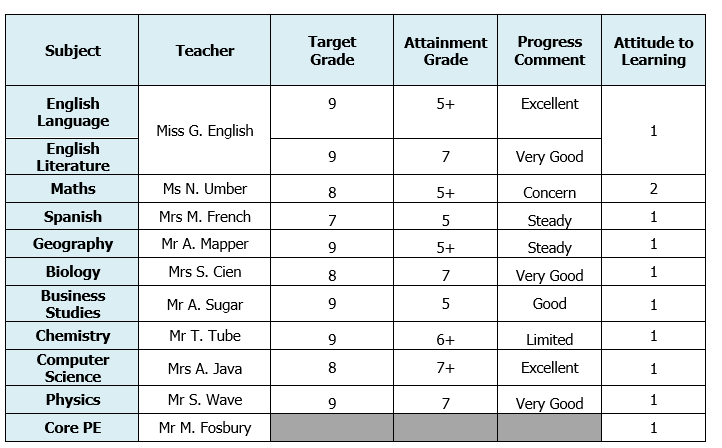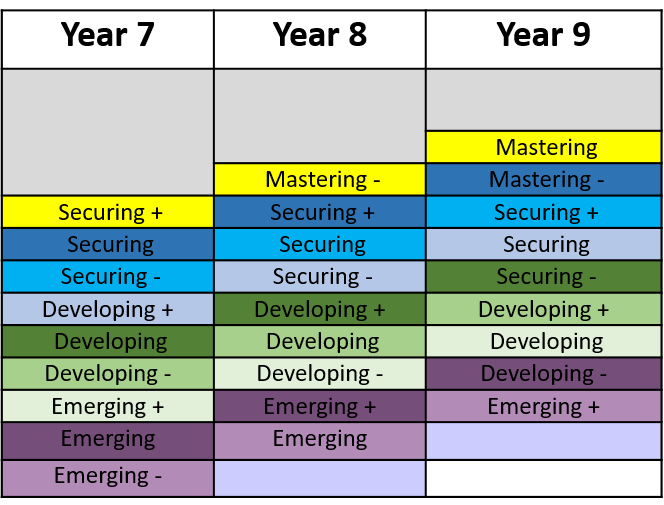- School Info
- Parents & Carers
- Term Dates and School Calendar
- The School Day
- School Uniform
- Mobile Phone and Portable Music Players in School
- Attendance
- Class Charts for Parents
- Homework
- Admissions
- Essential 8 - Ready to learn
- Handbooks for Parents & Pupils
- Letters Home
- Lunch Menu
- Newsletters
- Online Advice (E-Safety)
- Parent View
- Safeguarding
- Personal Development
- Work Experience
- Year 7 Parent Event
- Progress Reports
- Cost of Living Support
- Hillside Pantry
- Team Around The School
- Curriculum
- Pupils
- Calendar
- News
- Contact
- Statutory Policies
- Job Vacancies
- Train to teach
- Home
- Parents & Carers
- Progress Reports
Progress Reports
You will receive a report about your child's attendance and progress at three points throughout the academic year.
Progress reports will contain information about your child's attainment in all of their subject areas.
Year 10 and 11 Reports Include:
- Current attendance %
- Target Grade
- Attainment Grade for each subject
- Progress comment
- Attitude to Learning Grade for each subject.
Key Stage 4 Sample Report

Target Grade
| The Target grade has been set for your child by their teachers to work towards to achieve their full potential. This can vary for subjects depending upon your child’s skills, talents and aptitude.
|
Attainment Grade |
The Attainment Grade indicates the grade your child is currently achieving based on the body of work completed so far, including examinations, mini assessments, work in books and participation in lessons.
GCSE Grades (9-1) KS4 Attainment Grades are stated in GCSE grades ranging from 1 (lowest) to 9 (highest). A GCSE grade 9 is for a pupil who has performed exceptionally well and is a higher grade than the previous A* highest level GCSE grade. A grade 4 is the equivalent of a C grade, known as a standard pass. A grade 5 is also a C grade but is known as a strong pass.
Fine Grades Grades may have a positive or negative symbol next to them, eg. 4-, 4+. 4+ means a secure grade 4 working towards a grade 5. 4means a secure grade 4. 4 – means a weak grade 4, not yet secure.
Vocational Grades (D2* - P1 – Sports, IT, Performing Arts – Drama/Dance, Hospitality) These grades are stated in Vocational grades ranging from D2* being the highest and P1 being the lowest. • D2* is the equivalent of a grade 8.5 or grade A*/A • D2 is the equivalent of a grade 7 or a grade A. • M2 is the equivalent of a grade 5.5 or a grade B • P2 is the equivalent of a grade 4 or a grade C, known as a standard pass. • D1 is the equivalent of a grade 3 or a grade E. • M1 is the equivalent of a grade 2 or E/F grade. • P1 is the equivalent of a grade 1 or a G grade.
We would expect pupils to make one grade of progress from this point in Year 11 to the grade they achieve for their final GCSE examinations later in the year.
|
Progress Comment
|
Your child’s progress has been described in words. The comments used to describe progress reflect the amount of work completed as well as expectations of where students should be at this point in a particular subject. The progress comment compares pupils work to their potential. Class teachers have five progress comments to choose from
|
Attitude to Learning Grade |
Your child has been given a score (1, 2 or 3) for his/her attitude to learning in lessons and attitude to homework. The key provides an overview of what each score means: ·1 – Positive attitude to learning ·2 – Attitude to learning requires improvement ·3 – Attitude to learning is a Cause for Concern
|
Key Stage Three Sample Report

Guide To Reports
Pupils have been given attainment grades for each of their subjects based on work they have completed in class, assessments, homework and any other information teachers have about pupils’ performance.
Key Stage Three Attainment Grades

Attainment Grades are stated in words and describe to what extent pupils have mastered the skills, knowledge and understanding of the Key Stage Three curriculum for each subject. Pupils should make one grade of progress throughout each year.
- Year 7 - most pupils should be achieving Emerging and Developing grades by the end of the year
- Year 8 - most pupils should be achieving Developing and Securing grades by the end of the year
- Year 9 - most pupils should be achieving Securing and Mastering grades by the end of the year
For more detailed information about what attainment grades mean in different subject areas, please click here:-
Key Stage Three Assessment Steps
Key Stage Four Attainment Grades
Key stage four attainment grades are stated in GCSE Grades which range from 1 being the lowest to 9 being the highest. A GCSE grade 9 is for a pupil who has performed exceptionally well and is a higher grade than the previous A* highest level GCSE grade. A grade 4 is the equivalent of a C grade, known as a standard pass. A grade of 5 is also a C grade but is known as a strong pass.
We would expect pupils to make two levels of progress from beginning their GCSE studies in Year 10 to when they sit their final GCSE examinations in Year 11.
On Track Rating
The On track rating indicates if your child is “On track” or not for each of their subjects.
- On Track means they are on track in this subject area.
- Below means they are working below where we would expect them to be at this point in the year and they are not “On Track”
- Well below means they are working well below where we would expect them to be at this point in the year and they are not “On Track”
Attitude to Learning
1: Positive Attitude to Learning
- The pupil is positive about their learning and demonstrates a keen attitude towards improvements.
- The pupil makes a conscious effort to ensure the quality of work is produced in-line with ability.
- The pupil makes a conscious effort to improve areas identified by the class teacher – this includes acting upon verbal and written feedback.
- The pupil completes an appropriate amount of work during the lesson.
- The pupil attends revision session if required. Homework and revision activities are completed on time and to a standard that is deemed acceptable in-line with the pupil’s ability.
- The pupil models the Hillside Way ethos.
2: Requires Improvement
- There are areas that the pupil needs to improve; he/she is not working to their full potential.
- The standard of wok produced is not in-line with the pupil’s ability due to lack of effort.
- The pupil may demonstrate a lack of motivation and/or a lacklustre approach toward learning activities.
- The pupil doesn’t have the basic or subject specific equipment, ‘Essential 8’ consistently.
- The standard of homework is below the pupil’s ability and sometimes late/or not submitted.
- The pupil’s attitude towards intervention/catch up sessions is not positive.
3: Cause for Concern
- The pupil’s effort levels are a major cause for concern.
- The standard of work being produced is significantly below the pupil’s ability due to a serious lack of effort.
- The pupil’s engagement in the learning activities is minimal, thus impacting on progress.
- The pupil is poorly equipped for the lesson.
- Homework is often not submitted or lacks quality.
- If the pupil does not dramatically improve their effort towards the subject, progress will be affected.
Parents & carers
section
- Term Dates and School Calendar
- The School Day
- School Uniform
- Mobile Phone and Portable Music Players in School
- Attendance
- Class Charts for Parents
- Homework
- Admissions
- Essential 8 - Ready to learn
- Handbooks for Parents & Pupils
- Letters Home
- Lunch Menu
- Newsletters
- Online Advice (E-Safety)
- Parent View
- Safeguarding
- Personal Development
- Work Experience
- Year 7 Parent Event
- Progress Reports
- Cost of Living Support
- Hillside Pantry
- Team Around The School


